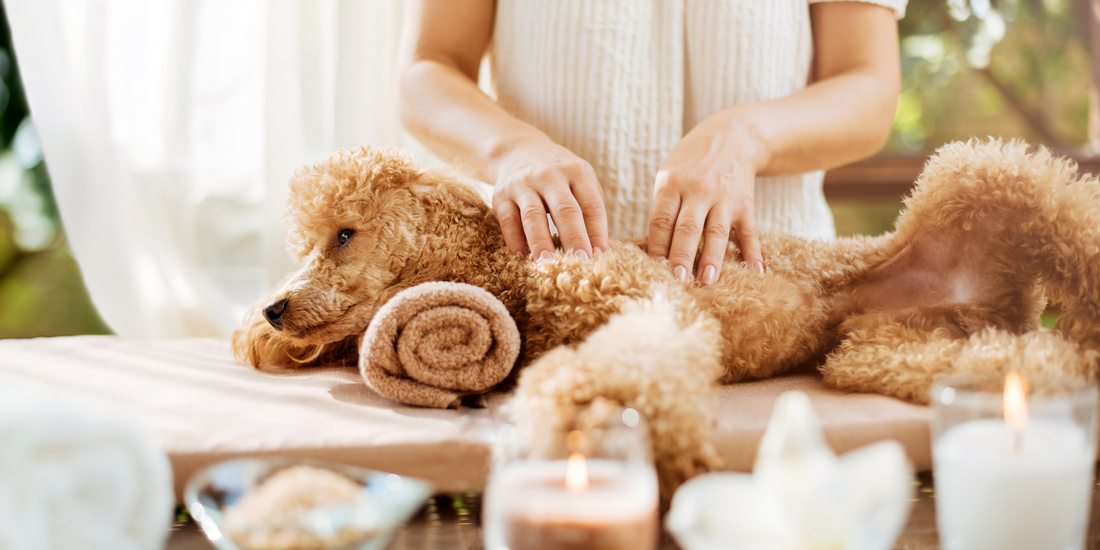Self-care is a popular buzz word these days. It involves taking action to improve or maintain your mental, physical and emotional health (particularly during times of stress). It can take many forms - from getting adequate sleep to working out to taking care of your body and beyond. Some people misconstrue self-care as being lazy, selfish or overindulgent. But that's not the case. By practicing self-care and focusing on our wellness and happiness, we are able to live and function better. It can be hard to get started, but looking to our canine companions for guidance can help. Here are eight self-care tips you can learn from your dog to help take care of yourself:
1. Get plenty of sleep.

On average, dogs sleep 12-14 hours per 24-hours, which means they spend 50% of their day sleeping. Although humans don't need that much sleep, scientific research shows that anyone young adult (generally defined as 18 to 22 or 18 to 25) or older needs between seven and nine hours of sleep. This is because sleep restores the body and its systems, on top of powering the mind. Even though dogs get almost twice as much sleep as humans, we can still learn from them that sleep is important for us too.
Specific benefits of adequate sleep:
- A sharper brain and memory leading to increased focus, retention of new information, ability to recall details and reaction times
- Boosts mood and motivation through increased emotional processing
- Lower risk of mental health or mood disorders, such as depression and anxiety
- Reduced risk of heart disease, stroke and diabetes due to lower blood pressure during sleep
- Muscle repair after working out
- Better performance for endurance sports like running, swimming, and biking
- Steadier blood sugar as the amount of glucose in your blood drops during the deep, slow-wave part of your sleep cycle
- Increased ability to fight germs and illnesses, as well as overall function of the immune system
- Weight and appetite control as sleep deprivation messes with the leptin and ghrelin hormones in your brain, which control appetite
2. Move your body.

In general, dogs need between 30 minutes and two hours of exercise a day depending on their age, breed and health. For humans, it's recommended that we get at least 150 minutes of moderate aerobic activity (brisk walking, leisure bike riding, gentle swimming) or 75 minutes of vigorous aerobic activity (running, biking, swimming, etc.) spread out over the week. This would amount to 30 minutes a day for five days a week of moderate aerobic activity or 15 minutes a day for five days a week of vigorous aerobic activity. This is a minimum recommendation, so more exercise means more health benefits.
Specific benefits of exercise:
- Weight control and lower risk of obesity
- Strengthens the heart and improves circulation, which raises oxygen levels in the body
- Lowers blood pressure, triglyceride levels and cholesterol
- Manages or even lowers blood sugar and insulin levels
- Improves mental health and mood, reduces stress and risk of depression, and increases relaxation and energy levels
- Strengthens bones and muscles and slows the loss of bone density and muscle mass
- Improves sleep by helping you to fall asleep faster and stay asleep longer
- Sharpens the brain by stimulating the body to release proteins and chemicals that improve brain function and structure
- Improves sexual function, reduces the risk of erectile dysfunction in men and increases sexual arousal in women
- Increases the chances of living longer by reducing the risk of diseases like:
- Heart disease and heart attack
- Stroke
- High blood pressure
- Diabetes
- Obesity
- Osteoporosis and fractures
- Depression
- Colon, breast, lung and uterine cancers
- Dementia and memory loss
Pro Tip: Looking for a dog to be your exercise buddy? Check their breed to find your match. If you want more vigorous exercise, opt for sporting and herding breeds who tend to need 60-90 minutes of rigorous exercise a day (such as running or hiking). If you want moderate exercise, opt for toy breeds or giant dogs who tend to only need around 30-60 minutes of exercise a day.
3. Unplug each day.

Dogs don't have the same issues that humans do when it comes to technology. Between the internet and social media, we have constant access to news and information overload. Our dogs, though, do not live in the same hyper-connected world. What we can take away from them is the importance of reducing screen time and unplugging daily. Doing so will provide you with physical, emotional and mental health benefits.
Specific benefits of unplugging daily:
- Improves present-moment awareness and reduces the fragmentation of our moment-to-moment experience
- Provides more downtime for your mind and body to rejuvenate
- Increases mindfulness
- Improves sleep through the reduction of blue light, improved melatonin release, falling asleep more quickly, feeling more rested and allocating time to sleep instead of screen time
- Boosts mood by reducing stressors such as social media, work emails, etc.
- Decrease depression and anxiety
- Improves social connections and human relationships through better interpersonal communication, conversation, attentiveness and empathy
- Improves productivity, learning, focus and intellectual acuity
- Improves quality of life and helps you recharge
- Reduces the chance of technology related injuries such as "tech neck"
4. Make time to play.

Dogs love to play, but it also has benefits for them. Not only does it provide your dog with physical exercise, but it also provides mental stimulation. But playing doesn't just have to be for dogs and kids - adults can do it too. In fact, playing has been shown to have benefits for humans too. These include mood improvement, stress relief, strengthened bonds, added joy to life and improved learning.
Specific benefits of playing include:
- Relieves stress, depression or pain (temporarily) through the release of endorphins
- Boost mind, learning, creativity, problem solving and imagination
- Improves brain function and memory
- Increases energy levels
- Improves the ability to fight off disease
- Fosters connections, relationships, trust, compassion, intimacy and empathy
- Helps develop and improve social skills, such as communication and cooperation
- Improves emotional health and heals emotional wounds
5. Get some fresh air.

Dogs love being outside and there are several reasons for this. For starters, they descended from wolves and wild dogs who lived in the great outdoors, so it's engrained in their DNA. Being outside not only provides physical benefits for your dog, but also mental ones - such as freedom (even on the leash), exercise and weight control, social interaction, fresh air, Vitamin D, breaks from toxins and interesting sights and smells. It also reduces boredom and anxiety. But getting outside doesn't just have benefits for your dog, it also helps you.
Specific benefits of spending time outdoors:
- Boosts immune system, such as increased production of white blood cells and T-cells
- Increases Vitamin D
- Improves mood and mental health and reduces stress, anxiety and depression
- Boosts energy levels and restores mental energy (relief from "mental fatigue")
- Improves focus, creativity and short-term memory
- Provides exercise and weight management
- Improves balance and coordination
- Strengthens bones
- Provides social interaction
- Improves sleep by setting your sleep cycle and internal clock
- Helps improve self-esteem
- Reduces inflammation
- Relaxes the mind and body
6. Stretch it out.

Have you ever noticed how many times your dog stretches? Dogs don't just stretch often because they nap often - they also do it to greet you, indicate a desire to play, as part of a mating ritual and to relax. But there are benefits to stretching including warming up muscles, boosting blood flow and releasing toxins. These also apply to humans!
Specific benefits of stretching:
- Increase flexibility and range of motion, delaying age-related reduced mobility
- Increases blood flow to muscles, which can shorten recovery time and reduce muscle soreness
- Improves posture by reducing musculoskeletal pain and encouraging proper alignment
- Relieves stress by releasing muscle tension caused by physical or emotional stress
- Reduces tension headaches by releasing muscle tension
- Calms the mind, relaxes the body and reduces mental fatigue
- Improves performance during physical activities and exercise
- Prevents and heals back pain, strengthens back muscles and reduces risk of muscle strains
- Reduces risk of injury, joint pain, muscle strains and muscle damage
7. Make time to relax.

As mentioned before, adult dogs sleep 12-14 hours a day. But dogs don't sleep in the same way that people do. Humans have a diurnal sleep schedule, meaning they sleep at night and are awake during the day. Dogs, on the other hand, don't get their sleep all at once. Yes, most dogs sleep with their people through the night, but they also sleep on and off throughout the day as well. Some vets call dogs "social sleepers" because they adjust their sleep schedule to their environment (or their people). For example, they may sleep 7 hours at night with you and then take naps while you're working during the day. But what we can take away from them is the importance of relaxing. Relaxation has been shown to improve our quality of life and well-being.
Specific benefits of making time to relax:
- Reduces stress and activity of stress hormones
- Lowers heart rate and blood pressure
- Improves digestion, lessens pain and manages irritability of the gastrointestinal tract
- Increases blood flow (by widening arteries slightly) and amount of oxygen reaching body tissues
- Reduces fatigue and restlessness
- Improves focus and clears the mind
- Boosts mood and reduces anger or frustration
- Reduces muscle tension and pain
- Lowers and maintains normal blood sugar levels
- Reduces inflammaton
- Lowers risk of heart disease, heart attack and stroke
- Slows breathing, which prevents a drop in carbon dioxide blood levels that can cause dizziness or weakness
- Boosts the immune system
8. Spend quality time with loves ones.

Dogs descended from pack animals that historically lived and traveled in close-knit groups. Years of domestication have caused dogs to become increasingly bonded with their humans. This means that dogs are wired to seek out our companionship (because we are their pack now). They may follow us wherever we go or desire to cuddle up next to us. Humans, too, are a social species. They have historically created communities, relying on others to survive. Although we have more advanced means of surviving today, we still need relationships. In fact, spending quality time with loved ones has been shown to have mental and physical health benefits.
Specific benefits of spending time with loved ones:
- Better ability and healthier ways to cope with stress
- Improves cardiovascular health (including potential lower blood pressure and heart rate)
- Provides social interaction and reduces feelings of loneliness or isolation
- Improves overall happiness and psychological well-being (such as stronger sense of purpose or meaning in life)
- Boosts cognitive functions and episodic memory
- Reduces wear and tear on the body from stress
- Improves mood
- Encourages healthy behaviors, such as exercise, and discourages unhealthy ones
- Improves illness recovery

